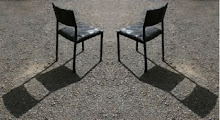
http://www.gestalten.com/news/detail?id=2428
Maarten Baas is a little bit of an enfant terrible within the design scene. He had to try more than once to convince his teachers at Design Academy Eindhoven of his talent.
When he presented his Smoke series of furniture, all doubts went up in smoke and it immediately gained him a lot of attention, e.g. Marcel Wanders incorporating it into his design company MOOOI. After exhibiting in Milan, London and Paris the Smoke series became an iconic collection in contemporary design.
At the Salone del Mobile 2008 Maarten launched Clay Furniture. In fall 2008 he will present new exciting objects for Established and Sons and if that wasn't already reason enough to meet him for a filmed interview then it surely was the unusual down-to-earth atmosphere of the former car repair shop which he took as the ideal location for his various designs. (View Video link)

























